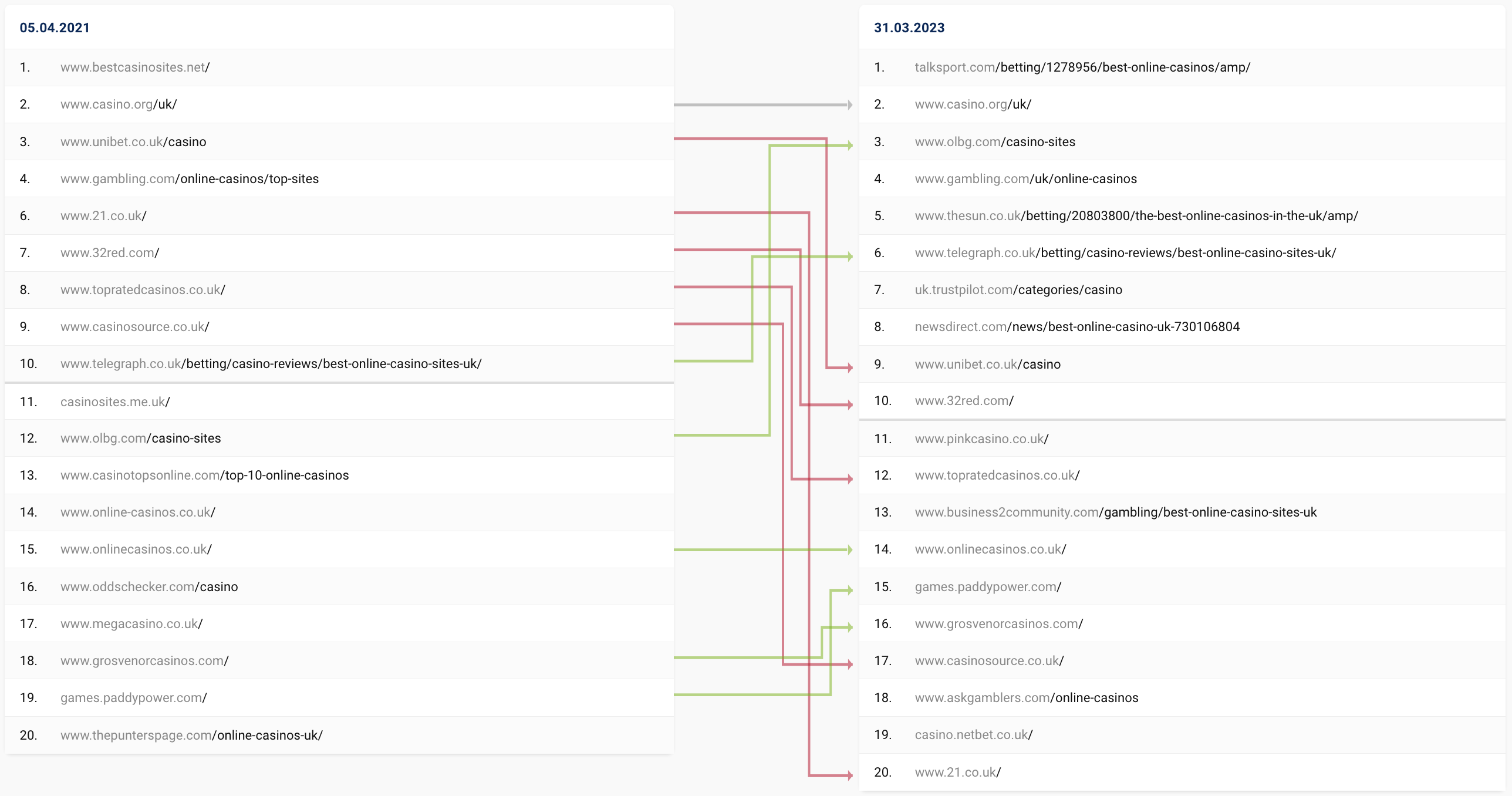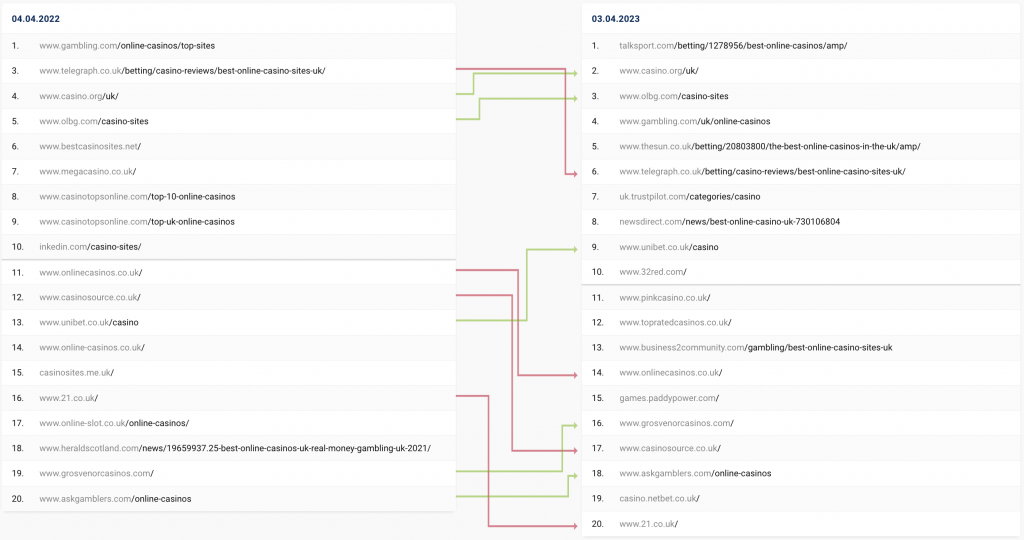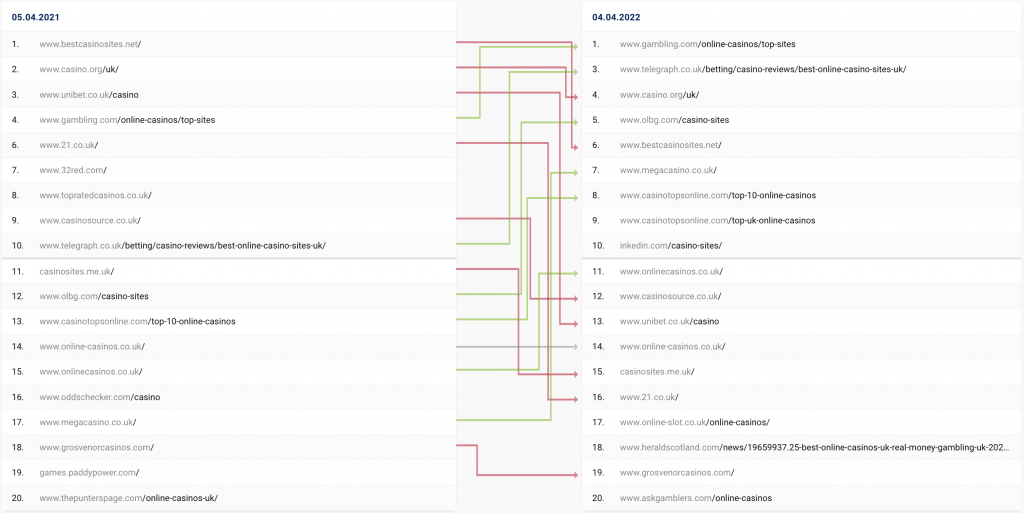Crashing the party: how mainstream media are entering casino SERPs

If you’re at least slightly interested in the online gambling search market, you couldn’t fail to notice the recent influx of large, (mostly) mainstream media sites in Google’s search results for gambling queries.
Historically, “online casino” Google SERPs have been strongholds for casino operators, whereas SERPs for queries like “best online casino” used to be the affiliates’ territory.
But not any more.
Now, an increasing number of SERPs see the seemingly unrelated mainstream media sites creeping into the rankings.
On Google.co.uk, four such sites can now be seen in the organic results on the first page of “best online casino” SERPs:


If we compare this March 2023 SERP to the same SERP from 2022 and 2021, we can see how the presence of mainstream media sites has been increasing:

In 2021, only the Telegraph among mainstream media makes in an appearance in the entire top 20. One year later, and the Herald Scotland has joined the party, appearing on the second page. Yet, by 2023 the first page is full of mainstream media sites, and on the second page Business2community.com crops up. This particular site was discussed in a recent article and is, strictly speaking, not the same as all these other mainstream media sites. That said, it’s still not the type of site you would expect to see in a SERP like that.

While this tendency is probably most pronounced in this particular SERP, other traditionally affiliate-dominated SERPs are not far behind:

And it is not just casino-related SERPs – betting SERPs are also beginning to be affected: the Telegraph is already on the first page of the “online betting sites” SERP.
All betting/casino content on the Telegraph’s site is provided by BettingExpert, an affiliate site owned by Better Collective. The accompanying press release published on Better Collective’s site on 19 September 2019 claims the affiliate entered into a “strategic commercial partnership” with the Telegraph in order to “deliver its innovative technology and commercial content for sports betting and casino”. The betting section of the Telegraph has been booming ever since – according to SISTRIX (whose keyword data for the gambling sector is pretty limited), it is now ranking for close to 44,000 keywords in the UK alone.

In the US, the situation is even more marked. The casino SERPs are completely saturated by mainstream media, including smaller local news sites:
Out of the top 10 results for “online casino sites” on Google.com, only three are actual traditional affiliate sites. Five are media sites (one of them – WTKR – appears twice), including the one in the featured snippet, and another is what can only be described as a ‘parasite’ page on a university site.
The Miami Herald belongs to McClatchy Media Network and the entire casino section of the site is provided by Gambling.com. SFGate and Times Union are owned by Hearst Communications and its gambling content provider is identified as FortuneCity. WTKR and KSHB belong to Scripps Media and the gambling content they publish is marked as “sponsored content” or “paid advertising”, without clear identification of which entity stands behind that content.
In recent years, a range of “content partnerships” have been concluded by many large gambling industry players:
- Gaming Innovation Group (GiG) entered into a partnership with NewsCorp (The Sun and TalkSport) in December 2022. This was then extended to include The Irish Sun in February 2023.
- Catena Media partnered with Advance Local in August 2022 to provide its content for NJ.com.
- XLMedia partnered with Advance Local in May 2022 to provide content via its brand Sportsbettingdime.com for Cleveland.com, adding MassLive.com to the deal in September 2022. It then also partnered with Newsweek in December 2022.
- Gambling.com partnered with USA Today’s owner Gannett Co in February 2023.
This list will likely keep growing in the coming months, and why wouldn’t it? These deals not only bring their gambling signees the audience of the respective media, but also act as a powerful booster to better organic visibility in the Google SERPs, allowing them to easily win any rankings they are after via these “rented” pages. In turn, online media sites receive an alternative source of income.
This situation is not unique to the English language SERPs of the UK and US – similar trends can also be seen on Google.de. Here’s a betting SERP featuring none other than Bild.de, one of German’s biggest newspapers, and it’s not the only mainstream media site here:
Why do these media sites rank so well? This whole situation reminds me of something I witnessed 10 years ago when the home page of the UK parliament site suddenly started ranking for “payday loans”. I never got any Google reps to confirm or deny this, but my working theory back then was that Google had some sort of white list of trusted sites as a way to counteract search spam.
Currently, in the case of some media sites such as the Telegraph, we may be dealing with a similar white list, although it may not explain quite as persuasively why smaller media sites, with obviously less authority, rank just as well especially in the US SERPs. After all, the content quality on all the ranking media sites differs a lot – from well-written pieces in Newsweek to semi-cloned typical affiliate spam in Scripps Media’s numerous outlets.
What can we expect in the future? In the short term, small and medium-sized affiliate sites will likely be hurt a lot by this development. As more and more partnership deals are concluded, the SERPs will be flooded by even more mainstream media sites of all kinds. But everything that gets used (and abused) a lot eventually gets overused – and then comes the backlash.
In 2014, press release sites used to rank for just about everything but with the Google Panda 4.0 update, many of them have dropped into oblivion. We cannot predict for sure if the same fate awaits this page rental media trend, but it will certainly be interesting to see how things develop.

Image by Freepik






